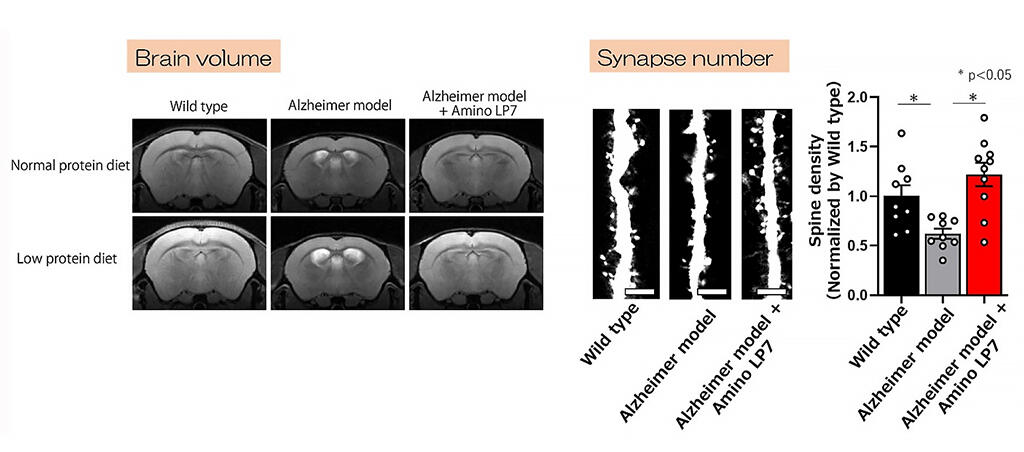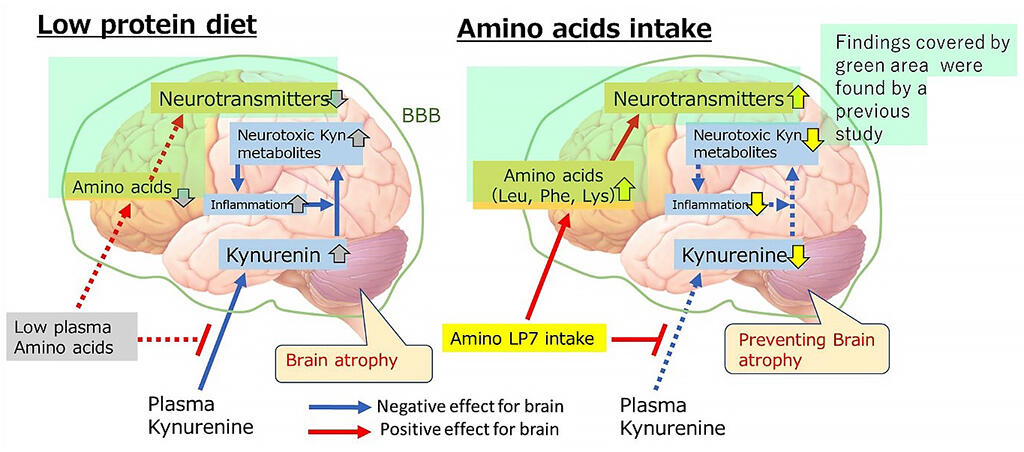In collaboration with Ajinomoto, Director Makoto Higuchi, and Senior Researcher Yuhei Takado of the Department of Functional Brain Imaging, Institute for Quantum Medical Science, Quantum Life and Medical Science Directorate, and National Institutes for Quantum and Radiological Science and Technology (QST) announced that ingestion of seven essential amino acids that are neurotransmitter precursors suppresses the progression of dementia. In dementia mouse models that ingested these amino acids, cerebral atrophy due to neuronal cell death was significantly suppressed despite the accumulation of abnormal proteins. It has been shown that pro-inflammatory kynurenine shares a transporter with amino acids. Therefore, these amino acids may prevent kynurenine from entering the brain due to competition. These findings may help in the development of treatments for dementia. The results were published in Science Advances, an international journal.

Provided by QST
Accumulation of the causative protein of dementia begins 20 to 30 years before the onset of symptoms; hence, lifestyle is considered to contribute to the risk of dementia. It has been reported that patients with dementia have significantly lower protein intake than their healthy elderly counterparts, and that dietary protein intake and the memory capacity of elderly people are positively correlated. Proteins are composed of amino acids, and precursors of neurotransmitters are composed of essential amino acids. Due to this, the intake of amino acids seems to be effective for the maintenance and improvement of cerebral function.
In clinical trials, it has already been shown that ingestion of seven essential amino acids (Amino LP7), which can cross the blood-brain barrier at a specific rate, improved cognitive function in the elderly in the intake group compared to the non-intake group. This product was commercialized as "Brain Activity Seven Amino." Previously, the study group confirmed that "Amino LP7" ingestion reduced memory and cognitive impairments in aged mice. However, the mechanism remained unclear.
In this study, the research group investigated the mechanism by which essential amino acids, which are the source of neurotransmitters, help maintain brain function using mouse models of dementia (Alzheimer's disease). First, dementia model mice were fed a normal diet plus Amino LP7 for 3 months. Then, the degree of cerebral atrophy was compared with that of the group without Amino LP7 inoculation. Cerebral atrophy was measured via MRI. In the non-intake group, cerebral atrophy of approximately 20% was observed. In the intake group, no atrophy was observed. When a similar test was conducted on a low-protein diet assuming a decrease in appetite due to aging, cerebral atrophy of approximately 30% was observed in the non-intake group. However, cerebral atrophy was suppressed in the intake group. Further examination of synaptic changes in these mice showed that spine density, which was reduced in model mice, was maintained with Amino LP7 ingestion. On the other hand, Amino LP7 ingestion had no effect on the accumulation of tau lesions.
The group also performed a comprehensive genetic analysis of how "Amino LP7" works in large areas of the brain. Compared with healthy mice, the model mice had decreased expression of genes related to neuronal cell activity, increased expression of genes related to inflammation, and decreased expression of genes related to synaptic plasticity. However, these changes were restored to normal levels in the ingestion group. From these results, the authors focused on the inflammation that occurs in dementia.

Provided by QST
They investigated the brain disposition of the pro-inflammatory molecule kynurenine. Kynurenine is taken up into the brain from the blood via transporters. It shares these transporters with leucine and phenylalanine, which are included in "Amino LP7." The group, therefore, considered that kynurenine uptake may compete with the uptake of leucine and phenylalanine, and measured brain kynurenine levels in the inoculated and non-inoculated groups. As a result they found that the increase in kynurenine levels in the brain in dementia was suppressed in the intake group. They showed that the consumption of "Amino LP7" prevented the influx of kynurenine into the brain and suppressed inflammation before the onset of cerebral atrophy. "In the future, the group aims to study the efficacy of the drug in humans through symptom and blood assessments, taking advantage of QST imaging," Dr. Takado said.
This article has been translated by JST with permission from The Science News Ltd.(https://sci-news.co.jp/). Unauthorized reproduction of the article and photographs is prohibited.




